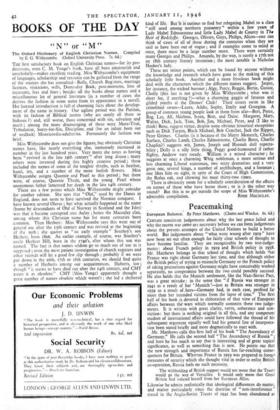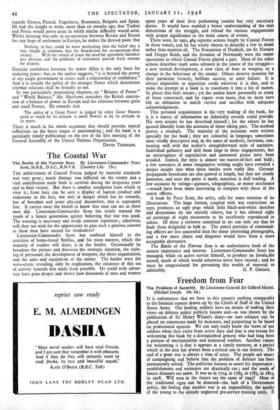Peacemaking
European Balance. By Peter Matthews. (Chatto and Windus. 8s. 6d.)
CERTAIN consistent judgements about why the last peace failed and why the recent war came are necessary before we can form judgements about the present_ attempts of the United Nations to build a better world. But judgements about "what went wrong after 1919" have now been set out often enough for fairly clear schools of thought to have become familiar. They are recognisable by two test-judge- ments: about French policy in 1919 and British policy in 1938. Mr. Matthews belongs to that school of thought which holds that France was right about Germany last time, and that although either the British policy of trying to reconcile Germany or the French policy of taking precautions against Germany might have conceivably worked separately, no compromise between the two could possibly succeed. He also holds that the Munich settlement, like the Nazi-Soviet Pact, was a great mistake : in the sense that "if Russia was stronger in 1941 as a result of her 'Munich '—just as Britain was stronger in 1939 as a result of ..hers—Germany had, in each case, profited far more than her intended victims from the lapse of time." The first half of his book is devoted to elaboration of that view of European affairs between tit& -wars which normally connects these two judge- ments. It is written with great clarity, verve, coherence and con- viction: but there is nothing original in all this, and any competent student of international affairs could have followed the thread of his subsequent argument equally well had his general line of interpreta- tion been stated briefly and more dogmatically to start with.
Mr. Matthews calls this first half of his book "The Ascendancy of Germany." He calls the second half "The Ascendancy of Russia " ; and here he has much to say that is interesting and of great topical significance, as well as something that is new. He points out that the new strength and importance of Russia has far-reaching conse- quences for Britain. Whereas France in 1919 was prepared to forego measures of security which she thought vital in order to enlist British co-operation, Russia feels no such necessity.
The withholding of British support would not mean that the Treaty would go the way of Versailles. It would only mean that Grea: Britain had isolated herself from her European Allies.
Likewise he admits realistically that ideological differences do matter, and matter particularly since the doctrine of " non-interference " stated in the Anglo-Soviet Treaty of 1942 has been abandoned al
regards Greece, Poland, Yugoslavia, Roumania, Bulgaria and Spain. He had the insight to write, more than six months ago, that Turkey and Persia would prove areas in which similar difficulty would arise. Whilst insisting that only in co-operation between Britain and Russia lies any hope of settlement in Europe, he makes the shrewd point that
Nothing, in fact, could be more misleading than the belief that a war, fought in common, lays the foundations for co-operation after victory. . . With the return of peace the need for agreement becomes less obvious, and the problems of settlement provide fresh reasons for dispute.
Genuine confidence between the major Allies is the only basis for enduring peace : but, as the author suggests, "it is beyond the power of any single government to create such a relationship of confidence." And it is usually the policy of the stronger Power which determines whether relations shall be friendly or not.
In two particularly penetrating chapters, on "Balance of Power" and "World Balance," Mr. Matthews considers the British concep- tion of a balance of power in Europe and the relations between great and small Powers. He remarks that
The policy of a Great Power is judged by other Great Powers quite as much by its attitude to small Powers as by its attitude to its peers.
There is much in his whole argument that should provoke topical reflections on the latest stages of peacemaking' and the book is a peculiarly timely publication on the eve of the first meeting of the General Assembly of the United Nations Organisation.
DAVID THOMSON.































 Previous page
Previous page